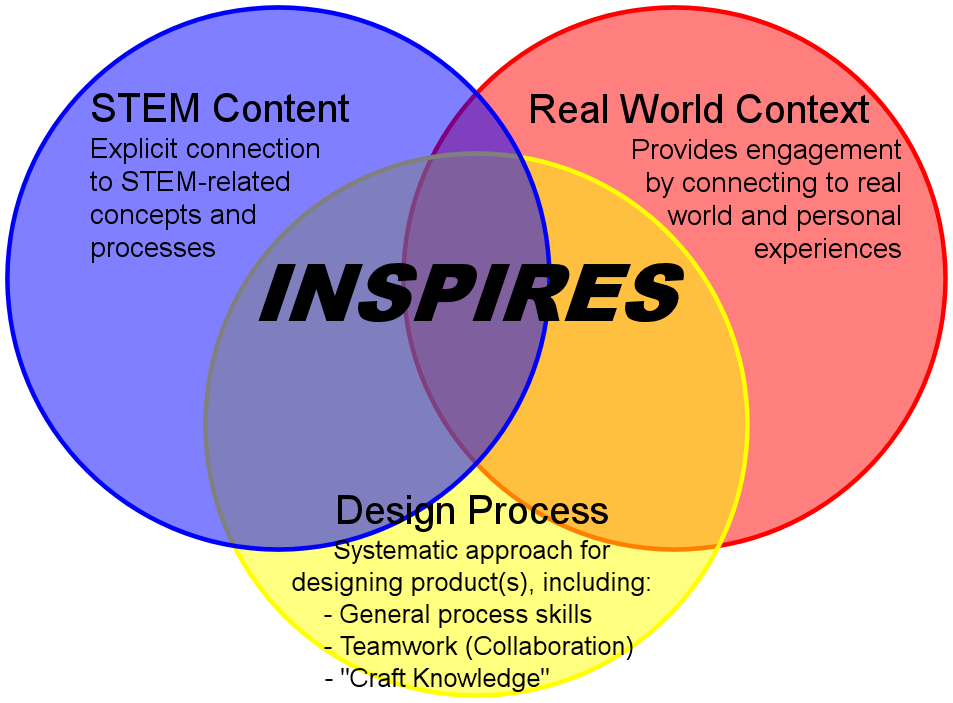
The current project focuses on one module of the INSPIRES Curriculum - Engineering in Healthcare: Hemodialysis Case Study. This 4-6 week, student-centered unit includes hands-on minds-on activities, digital resources and a real-world open-ended engineering design experience. P21 skills (critical thinking and problem solving; communication and collaboration; and creativity and innovation) are central to the INSPIRES approach. The curriculum is aligned to the Next Generation Science Standards, MSDE standards, the Maryland Technology Education State Curriculum, Maryland STEM standards of practice.
The project takes a comprehensive, systematic approach to professional development for teachers: 5-day intensive training programs in Summer 2015 and 2016 followed by implementation of the INSPIRES hemodialysis unit; participation in monthly meetings to support teacher learning, provide support and build collaborative teams; and optional attendance at a third summer institute for leadership development and expanded learning. Our PD strategy aligns to the Danielson Framework and supports the data-driven research program to identify factors that help improve faculty and student outcomes, particularly for underrepresented groups.
Teachers participating in this research study will be members of a professional learning community that promotes student-centered learning in their schools. Teacher team members will provide critical knowledge to the field about the integration of engineering into biology and technology courses and will enhance their ability to improve student retention, persistence, and performance. Team members will earn a stipend, receive classroom supplies, have opportunities to attend and present at conferences, and receive professional development credit through MSDE to support career advancement.
INSPIRES as Educative Curriculum Materials
In our current research, we have developed, tested, and revised five design-based curriculum units and an accompanying PD model that specifically address the challenges associated with teaching open-ended engineering design. This research has resulted in the articulation and refinement of a clear set of curriculum design principles for engineering design-based curricula as well as the corresponding PD model. As the research efforts from this grant come to conclusion, several outcomes are particularly noteworthy. Our research findings demonstrate both learning gains for high school students using the INSPIRES curriculum units as well as significant changes in teacher reform-based pedagogical practices during unit enactment. Taken together, the INSPIRES curriculum modules demonstrated an educative effect for the use of design-base pedagogy.
The INSPIRES units have been carefully constructed to be "educative" for teachers. A key component of our system is the integrated use of the educative curriculum materials to provide support for teachers by including features that stimulate reflection and promote connections among specific content, pedagogy and pedagogical-content knowledge. In alignment with best practices, the educative curriculum is a key component within a larger professional development framework. Providing teachers the guided experience of interacting with the educative materials from a student perspective, followed by reflective discussions focused on the pedagogical design of the lessons, provides opportunities for teachers to experience the benefits and limitations of a particular activity from the student’s perspective, as well as the "space" to discuss the rationale for how the activity was constructed and how it may be adapted in the future. Under these conditions the curricular materials serve as a scaffold by providing the teachers concrete examples for how to translate the abstract into a tangible useful product. Employing such a strategy has been reported as promoting significant changes in the content knowledge and pedagogical beliefs of high school STEM teachers.